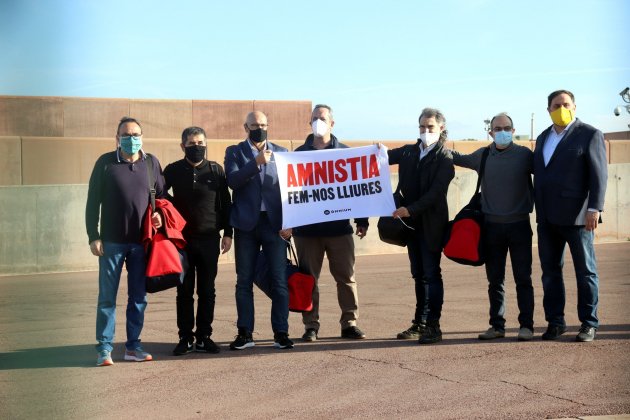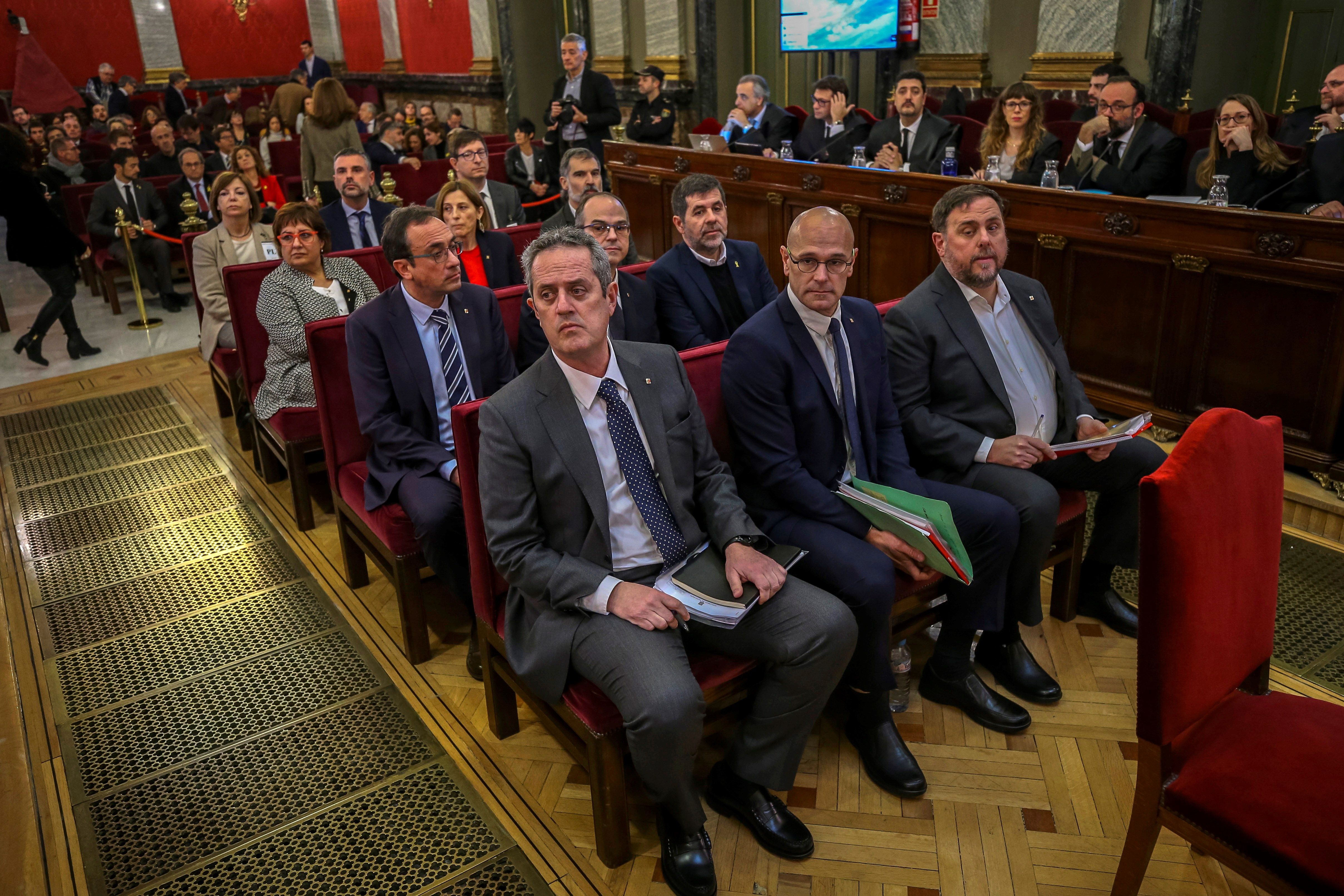The court that heard the Catalan independence trial in 2019 is opposed to granting any form of pardon - total or partial - to the 12 pro-independence leaders convicted of sedition, misuse of public funds and disobedience, as it fails to find any reasons of justice, equity or public utility that would justify the granting of this clemency measure.
Just minutes after this morning's swearing-in of ministers in the new Catalan government under Pere Aragonès, the Supreme Court made its decision public. It is a report that analyzes whether or not it is appropriate to grant pardons to the defendants, which would leave them at liberty and without a criminal record. The report is not binding on the Spanish government's decision on the question.
The last steps in the process of granting a still-hypothetical pardon come more than three years after the 1st October independence referendum of 2017, more than two years after the trial verdicts, and in the meantime there has also been a no-confidence motion that changed the Spanish government, a period of direct rule imposed on Catalonia and two elections to the Catalan Parliament. Following the Supreme Court report, the question lands on the table of the Spanish cabinet, which has the final say, before taking the pardon to the Spanish king for him to sign. Felipe VI has not maintained neutrality at any point during the process. On October 3rd, 2017, he took a clear position in a speech that, before the trial, condemned the Catalan government and Catalans themselves.
The court's reasons for rejecting pardons
The judges consider that the principle of proportionality in the sentences given to the pro-independence leaders has not been violated, that there is no evidence or indication they have shown any remorse for their actions and that the arguments on which the various requests for pardons are based, made by third parties, blur the argument for a pardon because they present the criminal responsibility as collective, and, in addition, they effectively propose that the Spanish government corrects the sentence decided by the Supreme Court.
The chamber states that the reasons invoked to support the total or partial voiding of the sentence imposed lose any justification because they "present as political prisoners those who have been the authors of a mobilization aimed at unilaterally subverting the constitutional order, overthrowing the ordinary functioning of the institutions and, in the end, imposing their own conscience on the convictions of the rest of their fellow citizens".
The report, presented by the presiding judge, Manuel Marchena, concludes that the sentence ceases to be necessary when it has fulfilled the purpose that justifies its imposition. Thus, "the confirmation of the failure of the objectives of special prevention, which can be appreciated without further arguments being required, obliges the rejection of the pardon." It carries on: "The chamber does not cling to already-obsolete conceptions about the importance of the re-socialization of the prisoners, above all, when they do not share or identify with the hegemonic social values. But this idea is not incompatible with the acceptance that a pluralist society, inspired by democratic values, can demand, by imposing a penalty that the rupture with the basis of social coexistence must never the be the fruit of a unilateral decision, based on the deceptive mobilization of a citizenry that is irresponsibly pushed towards the construction of a new state that only exists in the imagination of its promoters."
Lack of repentance
The court underlines that the convicted leaders have not helped to justify reasons of justice, equity or public utility that would legitimize the granting of pardons and notes that its report is unable to verify "the slightest evidence or the weakest indication of repentance."
"Not even if we were to make this legal requirement more flexible and detach it from the need for a sense of contrition for the actions carried out, could we glimpse an intention for a return to the legal order undermined by their offences. The message conveyed by those convicted in their final statements to the court and subsequent public statements is clearly expressive of their desire to re-offend in the attack on the pillars of democratic coexistence, even assuming that the struggle for their political ideals - of unquestionable constitutional legitimacy - would justify citizen mobilization to proclaim non-compliance with the laws, the replacement of the head of state and the unilateral displacement of the source of sovereignty," the judges stated.
In particular, the report cites Jordi Cuixart, who in his statement to the chamber stated that "everything he did, he would do again" because he did not commit any crime. These words are for the court "the best expression of the reasons why the pardon is an unacceptable solution to the early annulment of criminal responsibility. In fact, they express an anti-democratic attitude, in which one's own conscience and the social commitment that each citizen subscribes to would allow them to destroy the bases of social coexistence, to render ineffective the resolutions dictated by the judges and courts of a certain territory, to avoid the legal means for reforming a legal system and, in summary, to violate the fundamental rights of those other citizens who do not agree with those principles or that individual attitude", say the judges.
In their report, they recall that the court wanted to hear the convicts' views, in compliance with the pardon law, and that most of them, except Jordi Cuixart and Santi Vila, did not make any submission, so "with their silence they deprive us, the chamber, of the assessment of the decisive elements to support our report and, most importantly, force us to a flexible interpretation that does not see in this [failure to respond] a formal impediment pointing towards the rejection of the request".
As a result, the chamber interprets that the opposition of the convicted leaders to their sentences includes the implicit demand that their declared criminal liability should now be annulled through the exercise of the right of pardon.
"And this [is so], even if for strategic reasons of some kind, this will is not publicly expressed and, in some particular case, a rejection of this measure requested by others may even be clearly suggested, due to what it might mean to accept forgiveness for something understood as not requiring to be forgiven. And in other cases, indifference or indolence, apparent and purely feigned or real, places some of the convicts at a completely opposite point to the attitude that could be expected of those who aspire to be pardoned in accordance with the legally set-out parameters,” says the report.
Group responsibility
The court explains that the pardon, contrary to what some of the petitions filed on behalf of the convicted leaders suggest, cannot be presented as a "second hearing" before the Spanish government or as the ultimate mechanism to repair the alleged violation of fundamental rights. "Far from underlining the reasons that would show the sentence as being unnecessary, they choose to focus on a legal critique of the judgment made by this chamber, going so far as to question the precepts that makes the exercise of the jurisdictional function legitimate."
In its report, the chamber warns of a surprising blurring in the requests for the pardons, many of which do not mention considerations of equity or justice and which map out "a criminal responsibility that is collective, joint, shared by a plural active subject" which, says the report, would go by the name of "the prisoners of the independence process."
The court argues that this shared, group responsibility, linked by connections of ideological coincidence, hinders the presentation of an argument that would justify the annulment of the sentence and does not make it possible for such an annulment to be understood or justified.
Criticism of the prison administration
In the opinion of the sentencing court, the criterion used by the prison administration has not facilitated its task either, since, "from the start of the execution of the sentence and in the drafting of the reports attached to the file, under the appearance of a differentiated assessment, it has continuously unified the regime and treatment of the 'prisoners of the independence process' without taking into account the personal and individualized evolution of each of them".
This institutional criterion - the judges add - "with visible distancing from the legal requirements and which has had to be corrected time and time again by this chamber, has significantly obstructed compliance with the objectives of the sentence, fueling the fiction of a collective subject that would be entitled to a [more relaxed prison regime] and, now, to a right to pardon".

The male political prisoners leaving Lledoners jail / ACN
The powers in the penitentiary system in Catalonia belong to the Catalan government. Since the political prisoners were transferred to Catalonia, when Pedro Sánchez took the reins of the Spanish executive, they have been under the control of the Catalan justice ministry, in the hands of minister Ester Capella, of ERC. The treatment boards of each prison and the Penitentiary Services secretariat gave the assessments for work leave permission and the granting of a "Level 3" open prison regime, twice appealed and cancelled by the Supreme Court.
Proportionate punishments
The court denies the major accusation: that the sentences were disproportionate. Some of the requests for pardon justify the annulment of criminal liability due to the disproportionate punishments handed out for a crime against public order.
The chamber recalls that its sentence clearly proclaimed that the crime of sedition is considerably more than a crime against public order "which the proven fact of our sentence declares - even if partial and interested readings assert the opposite - is not equivalent to a simple overwhelming of the limits of public order. On the contrary, what the judgment describes is an attack on public peace and the fulfillment of laws and resolutions as the foundation of coexistence in the constitutional framework".
That is why the court considers that the approach must be different when what is at stake is not the preservation of public order, but rather the solidity of the pillars on which democratic coexistence is based.
The chamber analyzes the definitions of criminal offences that apply in foreign systems in relation to the events on trial and concludes that, from a comparative law viewpoint, a conclusion asserting a failure of the principle of proportionality must also be rejected.
In relation to the convicted leaders who were also convicted of a crime of misuse of public funds, it states that it is more than obvious that in any democratic penal system, the application of public funds for illicit purposes, through expressive acts of disloyalty in the handling of public money, constitutes a crime with sentences of significant deprivation of liberty.
The report also includes the reasons why it considers it unjust to grant a pardon to those convicted only for a crime of disobedience, who are not serving prison sentences. On this point, it states that its refusal to grant clemency stems from the absence of any motive to correct punishments that, in no way, can be considered contrary to the principle of proportionality. Above all, according to the chamber, because the payment of the pecuniary penalties imposed on them and the time elapsed since the sentence became final, rule out the annulment of sentences which occurs in a pardon.
The amnesty proposed by Cuixart: thoroughly blurred
Jordi Cuixart, the only one of the nine jailed leaders who did make a submission to the Supreme Court, stated that he does not accept pardon, but he does accept an amnesty, as a legal instrument of reparation for unjust sentences. Specifically, his letter states verbatim that "he has repeatedly stated publicly that as a political prisoner his priority is not to get out of prison but to resolve the political conflict for which he is serving a sentence, starting with an amnesty as a collective response rather than a pardon as an individual solution".

Jordi Cuixart at an Òmnium Cultural event / Sergi Alcàzar
The court explains that addressing the debate on the constitutionality of an amnesty as a formula for the generalised annulment of criminal liability declared by judges and courts would overwhelm the terms of this pardon report. But it adds that "this preference for amnesty - justified in political moments of transition from a totalitarian system to a democratic regime - dispenses with historical teaching that shows that, in many cases, amnesty laws have been the means used by dictatorial regimes to erase very serious crimes against people and their fundamental rights."
In the [Spanish] collective memory, adds the chamber, there are political decisions in favour of amnesty "which served to hide crimes whose pardoning and consequent impunity sought to disguise themselves through the euphemism of end-point laws, which had to be neutralized, precisely, by the courts".
Hence the difficulties that the chamber appreciates in understanding this unconditional preference for a legal instrument for the extinction of criminal responsibility - the amnesty - which for Cuixart would make his release legitimate, given his refusal of a pardon. "The first (the pardon) is presented as an instrument that would adulterate the dignity of those who are touched by it, while the amnesty would have a soothing effect that would project its healthy effects, not only in the criminal process already resolved, but also in the resolution of the political conflict".

